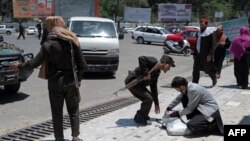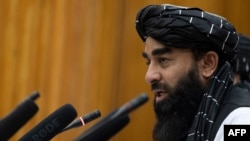The Taliban’s reclusive supreme leader Friday ruled out any talks or compromise on his “Islamic system” of governance in Afghanistan in an apparent rebuke to international calls for his hardline ruling group to ease restrictions on women’s rights to work and education.
“I am not here to fulfill your [foreigners'] wishes, nor are they acceptable to me. I cannot compromise on Shariah [Islamic law] to work with you or even move a step forward,” Hibatullah Akhundzada told a men-only closed-door gathering of around 3,500 mostly religious clerics in Kabul.
He made the rare public appearance and speech amid tight security. Audio of his speech was aired live by Afghan state-run social media.
Akhundzada hailed last year’s Taliban takeover of war-shattered, impoverished Afghanistan and the subsequent enforcement of the “Islamic system” there.
The insurgent-turned-ruling group seized power in August, when the United States and NATO partners withdrew their final troops from Afghanistan after almost two decades of military intervention.
"The success of the Afghan jihad is not only a source of pride for Afghans but also for Muslims all over the world,” Akhundzada told the audience.
“Mujahedeen [holy warriors] have established peace and order throughout Afghanistan in the last 10 months. It is a great achievement but its survival depends on us all being united,” he said.
Men only
The Taliban have installed a men-only administration, restricting women’s access to public life and preventing most teenage girls from returning to secondary school education. Women have been ordered to wear face coverings in public and have been barred from traveling beyond 70 kilometers without a close male relative.
The harsh treatment of women and girls and a lack of political inclusivity in governance have kept the global community from granting diplomatic recognition to Taliban rule.
Akhundzada, in an apparent response to the criticism, said that Afghanistan "is now a sovereign” country and did not need orders or interference in its affairs.
“They want to run Afghanistan on their whims,” the Taliban chief told the clerics. "They say, ‘Why don’t you do this? Why don’t you do that?’ Why do you even interfere in my work, my country and my principles?
“You have used the mother of all bombs and you are welcome to use even the atomic bomb against us because nothing can scare us into taking any step that is against Islam or Shariah,” the Taliban chief added.
Akhundzada referred to the U.S. dropping what was described as the “mother of all bombs,” or the most powerful conventional bomb in the American arsenal, in 2017 on an Islamic State terror base in eastern Afghanistan.
First such session since takeover
The three-day Kabul huddle began Thursday under tight security in and around the venue in the wake of a recent wave of deadly Islamic State attacks.
The meeting is the first of its kind since the Taliban takeover of the country. Critics saw the event as an attempt by the hardline group to demonstrate its hold on power and domestic legitimacy.
Taliban spokesman Zabihullah Mujahid told reporters after the inaugural session of the three-day Kabul meeting that women were not invited to the event because it was organized at the request of independent participating scholars and that the government had nothing to do with attendees nor the agenda.
Critics questioned the effectiveness and legitimacy of the grand scholars’ meeting in the absence of women, almost 50% of the country’s estimated 40 million population.
The Taliban takeover prompted Washington and other Western countries to immediately cut financial assistance to largely aid-dependent Afghanistan, seize its foreign assets worth billions of dollars, mostly held by the U.S., and isolate the Afghan banking system.
The action and long-running terrorism-related sanctions on senior Taliban leaders have thrown the cash-strapped country into a severe economic upheaval, worsening an already bad humanitarian crisis blamed on years of war and persistent drought.
Taliban and U.S. officials concluded a two-day meeting Wednesday in Doha, Qatar, where the issue of unlocking the frozen Afghan funds also came under discussion. The talks were the first in person since March, when the Taliban abruptly decided against allowing teenage Afghan girls to resume secondary school education, prompting Washington to suspend the dialogue.






